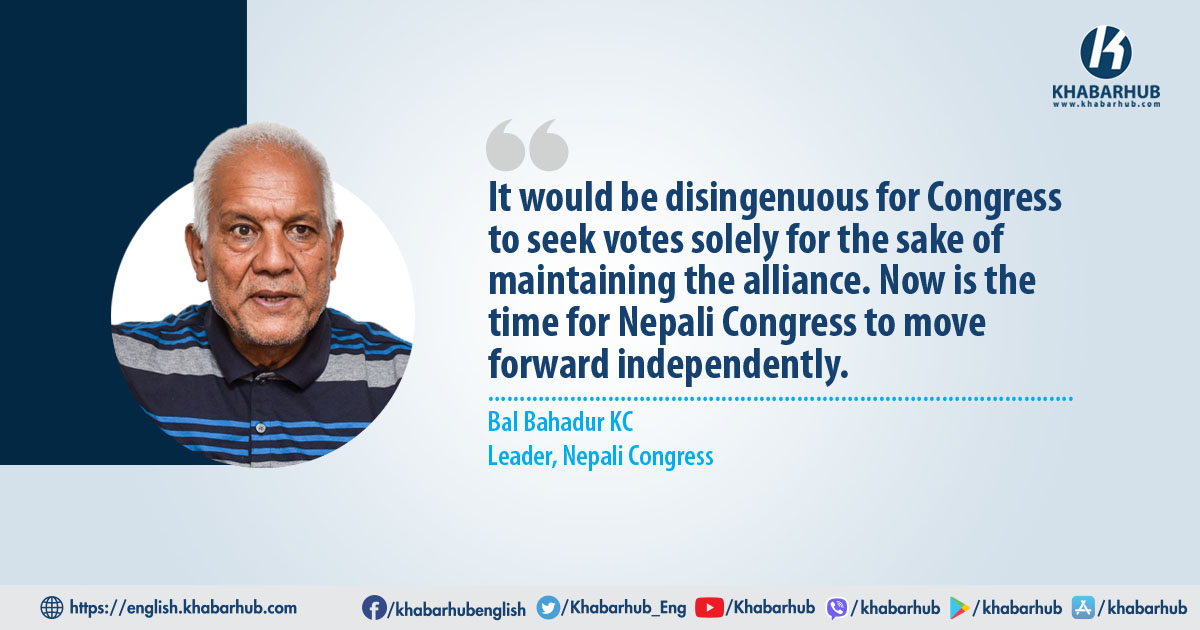KATHMANDU: It has been 100 days since KP Oli took the oath of office as Prime Minister, following an agreement between the two largest parties in the House of Representatives: the Nepali Congress and CPN-UML.
While PM Oli leads the government, the NC — now the second-largest party –accuses Singha Durbar of failing to utilize the coalition’s power during the government’s ‘honeymoon period.’
The main purpose of the seven-point ‘Chapali Height Agreement,’ reached on June 1 at the residence of businessman Rameshwar Thapa, is to amend the Constitution, create corresponding laws, promote good governance and development, and address economic stagnation.
Despite the presence of the Maoist Centre, which has repeatedly influenced the government amid a hung parliament, the essence of the Congress-UML agreement remains unconfirmed.
As the 100-day mark approaches, some factions within the Nepali Congress are questioning the justification for this coalition.
Recent decisions and statements from Prime Minister Oli have sparked suspicions.
In this context, Krishna Timalsina interviewed Bal Bahadur KC, a former minister and central member of the Nepali Congress, about the coalition government’s performance, achievements, and its future:
Prime Minister KP Sharma Oli has claimed that this government of two-thirds is not a lump of ash; no one can break it. However, the weight of his statements and decisions will inevitably fall on NC. How do you assess the government’s performance?
PM Oli’s representation of the government is often loud and largely irrelevant.
As the prime minister of a coalition with the Nepali Congress, the successes and failures of his administration reflect on us as well.
We have been honest in our efforts; however, if the alliance’s original purpose is not being realized, there’s no reason for Congress to continue supporting KP Oli unconditionally.
We have significant disagreements with how the Prime Minister has expressed himself and made decisions.
Prime Minister Oli stated that leadership of the government would transition according to an agreement between the parties, and that any changes would only occur after 2084 BS. When Prachanda was prime minister, his government collapsed after he claimed that his 32 seats were “magical.” Is Oli’s comment a joke, or does it reflect a confidence born from a lack of increased tension between Congress and UML?
We must analyze the nature of the leftist leadership. Whether it’s Prachanda or KP Oli, their leftist ideologies seem uncertain.
Prachanda has played numerous political games, and now KP Oli appears to be doing the same.
Initially, he distanced the Maoist Center from the Nepali Congress, only to later leave the Maoists and re-align with us. He orchestrates this political maneuvering within the current alliance.
The mission behind these actions remains unclear. While the seven points have been outlined, many aspects cannot be decided solely by this coalition.
Issues like constitutional amendment require the support of two-thirds of Parliament.
Furthermore, proper management is needed to navigate from the ground to the government.
Achieving two-thirds support in the lower house is not enough; we also need consensus in the National Assembly, which complicates matters.
Additionally, there are parties outside the House that must be considered for constitutional amendments.
If we attempt to amend the constitution without broad consensus, we risk jeopardizing even the fragile constitution we currently have. We should tread carefully before proceeding.
As a member of the body that crafted the constitution, I remember the challenges we faced.
It was created with great difficulty, and there were concerns even then about its current form.
The historical significance of this constitution must not be undermined by controversial amendments.
Furthermore, corruption has increased and must be addressed. The government has failed to deliver on its commitments. Since the establishment of the seven-point agenda, there has been little progress on key issues.
These actions are not limited to his party; they occur within the context of our alliance.
The Nepali Congress has genuinely adhered to the agreements made on our behalf.
More than external conflicts, the internal dynamics of this coalition may determine whether the government endures and adheres to the original agreement.
As criticism of the national consensus government increases, concerns are mounting within the NC about whether speaking out could jeopardize the alliance or cost them their position in government. Shouldn’t NC have addressed issues of good governance, particularly in light of scandals like Bhatbhateni and Lalita Niwas, where donations from embezzling businessmen were involved?
There is evident pressure on the leadership from both party leaders and activists.
However, the leadership must analyze the circumstances and articulate their views. It’s clear that commitments made during the formation of the alliance have yet to be fulfilled.
Due to flawed electoral alliances, we find ourselves in a situation where the parliamentary system is embraced, yet the largest party struggles to form a government.
The Nepali Congress and CPN-UML are not just partners; they are also close competitors.
There’s competition between the two parties at the grassroots level, where they sometimes occupy the same spaces in government but not in local contexts.
Coordination between UML-led municipalities and Congress-led rural municipalities is lacking.
This suggests that while the coalition was established on a theoretical agreement, a cohesive team from the center to the local level was never formed based on that agreement.
We have been honest in our efforts; however, if the alliance’s original purpose is not being realized, there’s no reason for Congress to continue supporting KP Oli unconditionally.
If such a situation arises, the Nepali Congress must reconsider its position.
However, as of now, the seven-point agenda has not been implemented effectively.
We should not succumb to fears about the Prime Minister’s potential departure, thinking only of our political survival. The essence of the Nepali Congress lies in doing what it promises.
Currently, the honeymoon period of KP Oli’s government is drawing to a close, and unprecedented criticism of his leadership and the coalition with Congress is emerging. What is your take on this?
While political parties often come to power, disregarding the people’s sentiments in the pursuit of power is misguided. The Congress party understands this deeply.
During the power-sharing negotiations, we were merely participants.
The real power dynamics were shaped by Prachanda and the two leftist parties, meaning our influence was limited at that time.
Nepali Congress is not a party that stays silent; we must make appropriate decisions at the right moments.
The leadership must pay careful attention to maintaining the alliance and implementing the seven-point consensus. Failing to do so could lead Nepal’s politics into a very challenging situation.
To claim that Congress was inactive or merely power-hungry is a misrepresentation of our approach.
As the largest party in the House of Representatives, shouldn’t Nepali Congress reflect on its political journey over the past 21–22 months?
This self-reflection is underway, as discussions about the effectiveness of our alliance culture and party-building efforts continue.
If the party does not secure a majority in elections, forming a coalition becomes necessary.
A serious debate is taking place regarding whether to forge alliances prior to elections or to form a government post-results.
There’s a growing sentiment that all parties should contest elections independently, a stance Congress has historically taken.
Due to flawed electoral alliances, we find ourselves in a situation where the parliamentary system is embraced, yet the largest party struggles to form a government.
The implications of this situation remain unclear. Unforeseen developments have occurred, and it is the leadership’s responsibility to genuinely and continuously foster the alliance between Congress and UML.
If there is a trend of criticism within NC, and UML begins to express suspicion over it, could we see the emergence of an UML-Maoist alliance?
The alliance must be grounded in the implementation of the seven-point agreement.
If this cannot be achieved, underlying issues may emerge, compromising the alliance’s integrity.
The purpose for which the coalition was formed must be realized through effective action.
If the alliance progresses positively, many beneficial outcomes are possible. Conversely, if it collapses, Nepal’s political landscape may fall into disarray.
It would be disingenuous for Congress to seek votes solely for the sake of maintaining the alliance. Now is the time for Congress to move forward independently.
Both Congress and UML should recognize that outside forces may aim to disrupt this alliance and push Nepal into a state of uncertainty. It is imperative that both parties work together to avoid such a fate.
The leadership must pay careful attention to maintaining the alliance and implementing the seven-point consensus. Failing to do so could lead Nepal’s politics into a very challenging situation.
What is the likelihood of a new power coalition forming?
I fear that Congress might fall into the same patterns when forming a new alliance.
From our perspective, both past and present alliances have been shaped by leftist maneuvering. If UML feels cornered, the country cannot be left in a political vacuum; a new coalition and government must emerge. We will not allow that to happen on our watch.
Given that Nepali Congress has decided to contest the next elections independently, doesn’t this make it easier for UML and the Maoists to navigate their political journey together?
Our political stance is clear, but the party system relies on both ideas and organization. In a sense, we have sacrificed both by entering this alliance.
There are two key reasons for this coalition. First, under the current constitutional framework and mixed electoral system, no single party is likely to secure a majority.
Second, some leaders have formed a coalition as a shortcut to power, undermining the integrity of our ideas, organization, and leadership.
This degradation must be addressed, and it’s time for us to refocus on the politics of ideas and activate our organizational strength.
Our principles and organizational identity differ significantly from those of other parties.
It would be disingenuous for Congress to seek votes solely for the sake of maintaining the alliance. Now is the time for Congress to move forward independently.









Comment